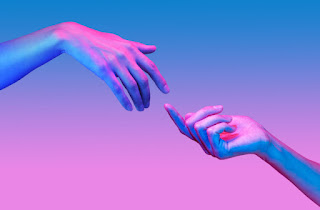Oh God Please, Someone, Hold my Hand!
After having read both of Ariel Glucklich’s Sacred Pains, I think the most shocking thing I learned — after the incredibly detailed explanation of torture methods used during the Spanish Inquisition and the notion that communicating pain creates similar behavior to that of the Marquis de Sade — was that while touch can inflict pain, lack of touch can too. It seems paradoxical at first, but upon further thought, I realized how powerful, prolonged touch deprivation could be.
To preface, I’ve never been an exceptionally touchy person. My family is Catholic, so any physical sentimentality we have for each other remains locked away until a death-bed confessional. Occasionally, we hug as hello or goodbye, but for the most part, we keep our hands to ourselves.
This is not to say I was deprived of physical touch as a child. If I asked for a hug or kiss, I quickly received one, but very rarely did I have that impulse. I was fine to simply exist among people with very little contact between us. It wasn’t until I began traveling and meeting new people that I realized this might not be a particularly healthy habit.
Touch is a sense meant to be used, and skin-to-skin contact is a particularly important aspect of that, not just in how it facilitates interactions with the world but as regulatory power for the body and the mind as well. It balances out the stress hormone cortisol, lowers blood pressure and heart rates, and stimulates oxytocin development, which helps prevent loneliness.
Alternatively, to be “touch starved” is to drastically damage one’s quality of life with frequent symptoms of anxiety, depression, and even sleep deprivation. I myself have experienced this pain, and it’s excruciating. While there’s no physical sensation to quantify, it caused my skin to ache and a hollowness to burrow in my chest. And in the wake of COVID, it got exponentially worse. I can only imagine the lasting effects that two years of total isolation will cause on a wider social scale.
Yet, Glucklich reminds us not to hide from this pain, instead insisting that we use its “raw and private sensation” to build community and solidify empathy with our fellow humans (Glucklich 393). He continues that “pain is unique among human experiences in being entirely objectless,” meaning that we must place productivity or purpose behind our suffering so that it is not wasted, which is a surprisingly comforting thought (Glucklich 391).


Comments
Post a Comment